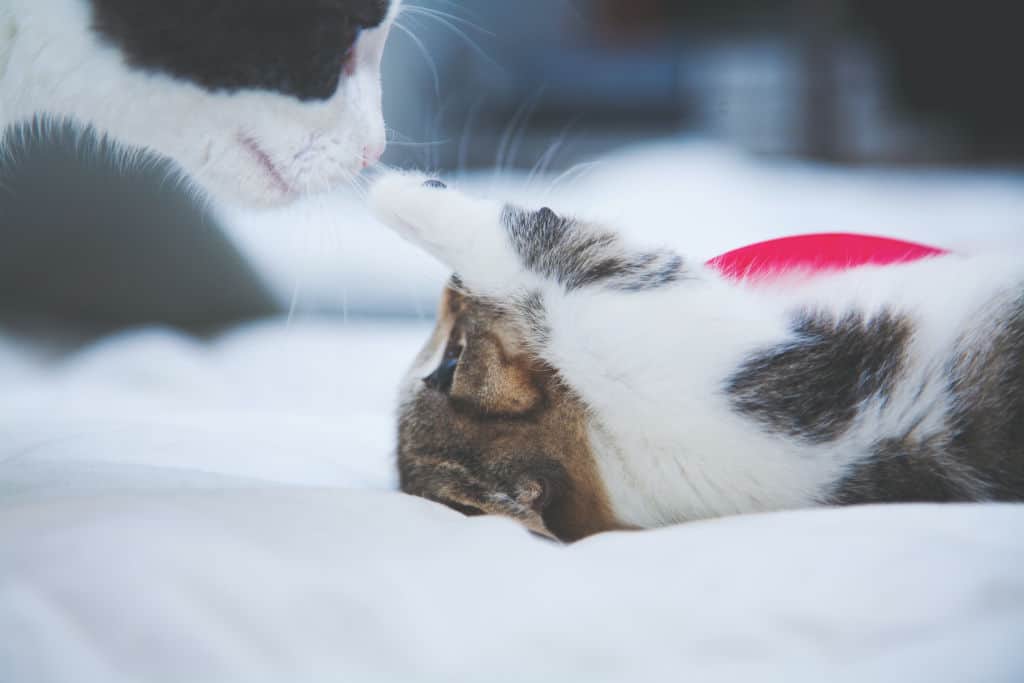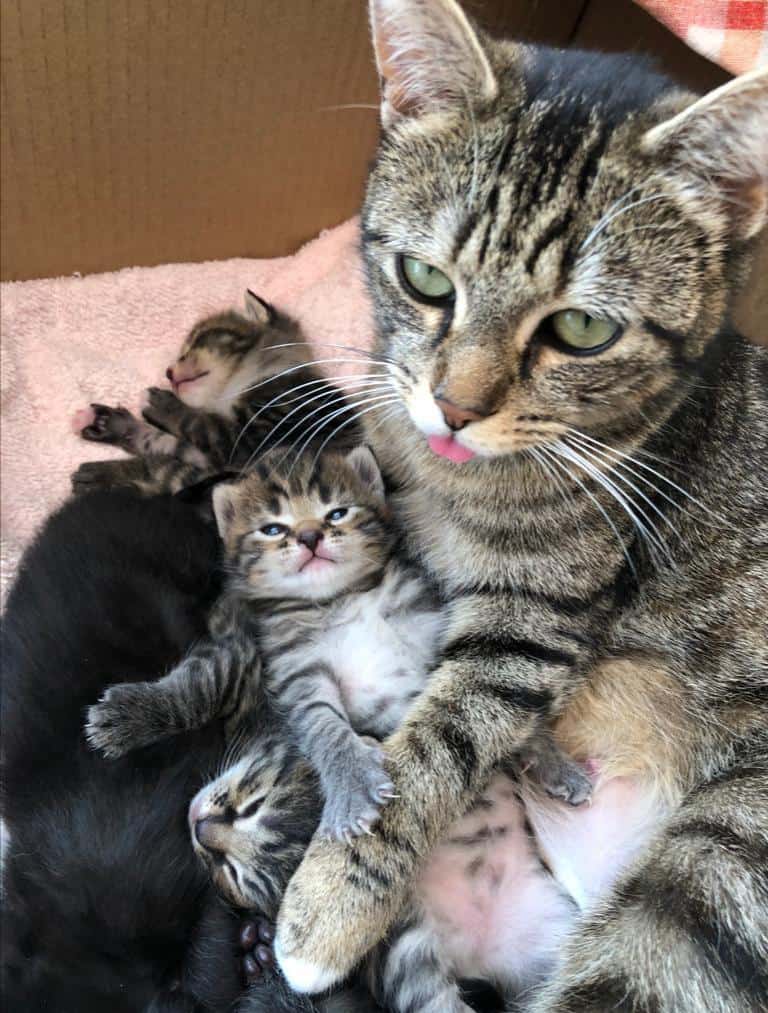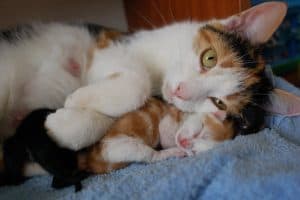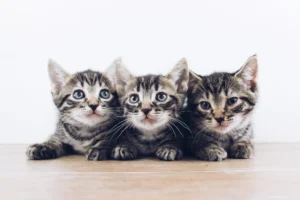Mother cats don’t just nurture their kittens but also engage in playful interactions with them, strengthening the bond and teaching important life skills. How exactly do they achieve this?
This article explores how mother cats play with kittens, when they get rough, how to distinguish play from a fight, and what you can do for the mom to help.

How Do Mom Cats Play With Their Kittens?
The initial play sessions between a mother cat and her kittens are critical in establishing trust. They set the foundation for the kittens’ interaction with other cats and even humans later in life.
Mother cats play with the kittens in many ways, such as:
- Chasing. The mother cat may chase her kittens to encourage them to run and acquire physical skills.
- Pouncing. The mother cat may jump on her kittens to teach them how to hunt and pounce on prey.
- Tug-of-war. She does this using a toy or a piece of thread, which can help the kittens develop strength and coordination.
- Hide and seek. She may teach her kittens to hunt and catch prey by playing hide and seek with them.
- Fetch. The mother cat may use a toy to play fetch with her kittens, assisting them in developing their coordination and hunting skills.
Physical activities such as chasing, pouncing, and wrestling are typical during regular play between a mother cat and her kittens. Shey may use her paws, teeth, and tail to urge the kittens to chase or “hunt” her tail.
Observing these activities can give owners an idea of which kitten might be more dominant or shy, aiding in potential pairing or separation decisions if adopting out.
These sorts of play help kittens develop physical abilities and reflexes and teach them how to hunt for food.
Do Mother Cats Discipline Kittens Through Play?
Mother cats can be rough with their kittens for several reasons. They often discipline their kittens through play, using their paws, teeth, and tail more assertively and less playfully. To reprimand the kitten’s behavior, they may lightly grip, bite, or even swat or growl at them.
This is known as “playful aggressiveness,” a standard method of teaching kittens how to hunt and behave. Cats don’t have many options for punishing and teaching their kittens what’s wrong, so a slap here and there is necessary.
This roughness is not only a teaching tool but also a test, pushing kittens to their limits and helping them identify their boundaries in interactions.
If you believe your cat is acting overly aggressive, you should visit a veterinarian or an animal behaviorist. If your cat is also stressed, check out our guide on how to have calm vet visits.
How Do Mother Cats Play Rough With Their Kittens?
Playful aggression, such as chasing, pouncing, and wrestling, is common when a mother cat teaches and bonds with her kittens.
Here are a few examples of rough play between a mother and a kitten:
- Biting occurs when the mother cat may bite the kitten’s neck or ears during play. However, it should be easy to tell that the mother isn’t being serious.
- Swatting, when the mother cat may use her paw to hit the kitten when it misbehaves. It happens occasionally but look for signs when the mom needs a short break from kittens.
- Growling or Hissing. The mother cat may growl or hiss at her kitten to assert her dominance or discipline her. Unless the mom does this constantly, it’s best to stay out of it.
When observing, you might notice a mother cat occasionally letting a kitten ‘win’ during these sessions. This boosts the kitten’s confidence and encourages it to engage more in the next play session.
Play fighting between mother and kittens is normal, but it should not be too rough or aggressive. If the mother cat is excessively harsh with her kittens, or if the kittens exhibit indications of pain or injury, remove them and give them a safe place to play.
Often, a mother cat gets a bit rough with a kitten, usually due to weaning them. Weaning is how a kitten transitions from being dependent on her mother’s care to becoming a more socially independent cat.
However, if the mother is snarling and hissing constantly, she may enter another heat cycle. If she is violent with the kittens, you may need to remove her for a week until her milk runs out and she can have her spayed. She can return with the kittens in about a week.

How to Distinguish Playing vs Fighting?
It might be difficult to distinguish between playing and fighting between a mother cat and her kittens because the two activities can occasionally appear similar.
However, there are a few significant distinctions to be aware of:
- Play fighting is usually more energetic and less aggressive. The mother and kittens will chase and pounce on one other, and both will usually vocalize in a fun manner (mewing, chirping).
- Fighting, on the other hand, is more intense and aggressive. The mother and kitten may bite or scratch more vigorously, and both parties may vocalize aggressively (hissing, growling).
If she’s holding back and not being as rough as she could be, letting the kitten fight her off and push her around in spots, it’s play fighting. When the mother cat cleans or grooms the kitten immediately after what seems like a rough interaction, it’s a sign that their bond is intact and the roughhousing was all in good fun.
Another thing to keep an eye out for is the cats’ body language. During play, cats will have a relaxed body posture. Their tails will be up and wagging, their ears will be back, and their eyes will squint. When cats fight, their body posture becomes tenser, their ears get flat back, and their tails become down or puffed.
If in doubt, it is advisable to be safe and keep the cats apart to protect the kittens’ security and welfare.
Do Mom Cats Get Tired of Their Kittens?
Mother cats instinctively love and protect their kittens, but it’s vital to remember that they are live beings with their own needs and boundaries. A mother cat may sometimes become tired or upset with her kittens, especially as they develop and become more active.
Keep an eye out for signs of a mother cat being overwhelmed, such as striking or pushing away her kittens. This is her method of expressing her desire for a break. This is sometimes the case with young mothers.
Giving a mother cat breaks in a separate room is a practical way to calm her down and recharge. Make sure she has a secluded, quiet space, and avoid bothering her too much. Allowing them to rest will allow the mother cat to rejuvenate and the kittens to develop stronger social skills with people.
Just like human mothers who cherish moments of ‘me time’, mother cats too benefit from short periods of solitude to rejuvenate and avoid getting overly stressed.
Cat mothers frequently become more distant and demanding with their young as they are weaning. She’s just trying to teach him to grow up, so she may appear to be striking the little guy, but she’s just training it to grow up.
Mother cats rarely become hostile towards their kittens, but if this occurs, it could indicate a behavioral issue. If the cat is continually growling, hissing, or hitting the kitten, you should consult a veterinarian or a professional animal behaviorist.
FAQs
Do kittens play with their mothers?
Kittens frequently playfight their moms by climbing on them, pouncing, chasing, and attacking their tails. This play assists the kittens in developing their athletic and hunting skills, as well as serving as a bonding between the mother and the kittens.
Do mom cats have favorite kittens?
Mother cats may have different levels of attachment to their kittens. Some may show preference, while others may not. Physical and personality traits can influence the mother cat’s attachment.
However, it’s important to note that the mother cat’s attachment may change as the kittens grow, and she may focus more on her own needs. Despite this, mother cats can provide care and nurture to their kittens.
Why do some mother cats attack older kittens?
Mother cats may attack older kittens for various reasons, including a sense of threat from their size and assertiveness, stress from their demanding behavior, or a desire to assert their authority. Keeping an eye on their conduct and giving them a safe and quiet atmosphere is critical.
Alex, a passionate animal lover, has experience in training and understanding animal behavior. As a proud pet parent to two dogs and three cats, he founded AnimalReport.net to share insights from animal experts and expand his knowledge of the animal kingdom.









